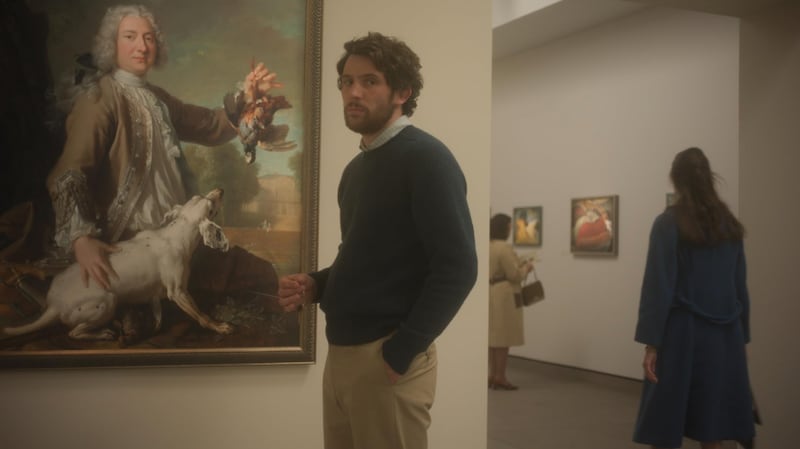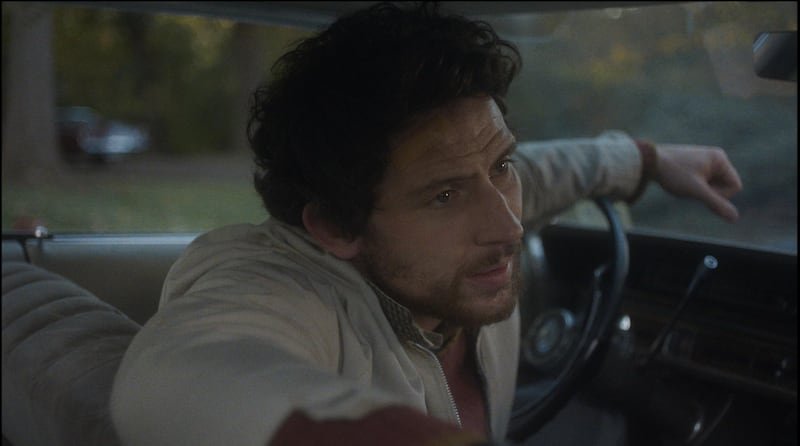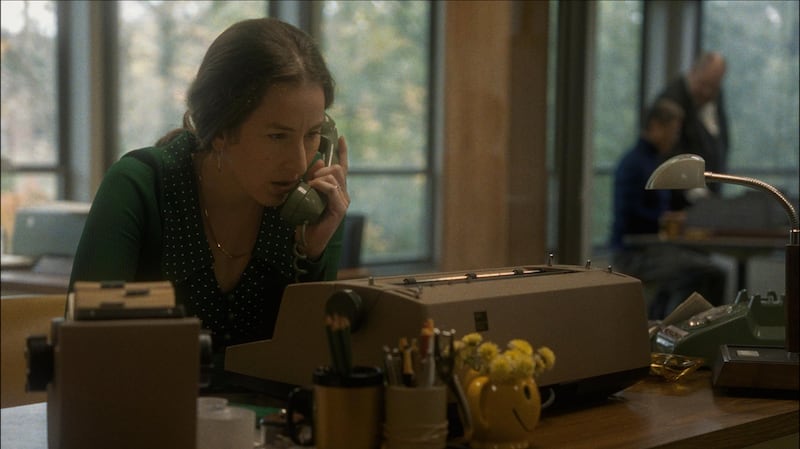With The History of Sound already in theaters and Rebuilding and Wake Up Dead Man on the imminent horizon, Josh O’Connor is having an all-time great year, and it continues with The Mastermind, an unconventional thriller—screening at the New York Film Festival ahead of its Oct. 17 release—that leans into his sharp, sad soulfulness.
More than just about any actor of his generation, the British star has a way of conveying complex depths without the need for mannered theatrics or showy histrionics, and in his latest, he exudes a strain of aimless, amoral desolation and desperation as a family man whose decision to embark on a life of crime proves unwise. Saying little but speaking volumes about American disaffection, apathy, self-interest, and foolishness, his performance bolsters this askew heist film and cements his status as cinema’s most magnetic new leading man.
As with 2013’s Night Moves, writer/director Kelly Reichardt employs genre for something more off-kilter and interior with The Mastermind, whose title refers to James Blaine Mooney (O’Connor), a husband to Terri (Alana Haim) and a father to twins Carl (Sterling Thompson) and Tommy (Jasper Thompson) in 1970s Framingham, Massachusetts.
In the town’s art museum, Terri wanders from display to display while her child blabs about fanciful sci-fi gibberish, and her gift for tuning out the world and focusing on what’s in front of her is shared by James. His alert eyes taking in everything around him, James surreptitiously pops a display case’s latch and pockets a small figurine, slipping it into an eyewear case and depositing that in his wife’s purse without looking down—a small, delicate feat that proves his force of concentration and, also, that he views art less as a vehicle for enlightenment than as a means to a personal end.

This minor theft is a trial run for James’ real plan: to pilfer four Arthur Dove paintings from the museum with the aid of partners Larry (Cole Doman) and Guy (Eli Gelb). This is hardly an upstanding way for an art school dropout to earn a living, and at dinner with parents Bill (Bill Camp) and Sarah (Hope Davis), a comment by his dad (who’s a judge) about a classmate’s business success—and the not-so-subtle implication that James could be doing more with his life—suggests that James is rebelling against the era’s status quo.
At a subsequent lunch, James lies to his mom about a job opportunity in order to borrow the money needed for his illicit operation, and when his driver Larry drops out at the last second, James opts to get behind the wheel himself. He additionally hires a third accomplice, Ronnie Gibson (Javion Allen), even though his cohorts aren’t totally thrilled with the idea.
A television report about the ongoing Vietnam War refers to the younger generation’s feelings of “powerlessness, cynicism, and apathy,” and James seems wracked by them too. The difference, however, is that rather than channeling his anger, sorrow, and fear into something productive—like the protests raging across the nation—he chooses to commit a relatively minor robbery in his own backyard.
The Mastermind’s pace is as deliberate and detail oriented as its protagonist, and Rob Mazurek’s jazzy score of jittery percussion, ominous bass, and mournful horns evokes the anxiety bubbling beneath his placid surface. Moreover, the director often segments her frame via paths, doorways, and other architectural structures, providing a visual corollary for James’ pent-up condition and walls-are-closing-in situation.

The Mastermind is enthralled by process, dramatizing with meticulous patience every major and minor step of James’ scheme. To a significant degree, it’s every bit as much a procedural as its classic heist-film forebears, and Reichardt generates simmering suspense and humor from fixating on her main character’s exacting moves, the funniest of which is a prolonged scene in which he strives to hide the pilfered paintings in a remote barn’s ladder-accessible loft.
Even once things go awry and James has to go on the lam, the writer/director never breaks her measured stride, keeping the film humming along at a careful tempo that amplifies its tension and, additionally, a sense of the thief’s purposelessness.
Traveling by bus, James visits his “country folk” friends Fred (John Magaro) and Maude (Gaby Hoffmann) and attempts to connect with additional acquaintances, but the further he ventures away from his clan, the more he becomes adrift, a loner in an autumnal land that’s cold, damp, unforgiving, and splitting apart at the seams.
The Mastermind doesn’t stoop to outright sympathizing with James, whom Reichardt and O’Connor imagine as an enigmatic loser who acts out recklessly and then roams about haphazardly, unsure of where he’s going and what he’s doing.
Worse, he’s a man who doesn’t quite know what he stands for, and O’Connor plays him as a me-first individual who, regardless of his perilous circumstances, never seems to grasp the damage he’s wrought or the pointlessness of it all—a notion epitomized by a late phone call to Terri, during which he feigns contrition and yet, in the face of her palpable disgust and disappointment, still asks her to wire him cash.

The Mastermind situates itself in quiet spaces and barren places, capturing a vivid strain of ’70s despair and disorientation, and its portrait of James grows less flattering as it shuffles toward its finale. O’Connor’s fugitive doesn’t change during his journey so much as resort to actions that are a natural extension of his imprudence and arrogance, and the film doesn’t flinch in its depiction of him as both a casualty, and the embodiment, of a Nixon-fueled national malaise. Despite James’ mounting unpleasantness, the actor remains transfixing—a testament to not only his charisma, but to his nuanced, full-bodied expression of the crook’s confusion, carelessness, and conceitedness.
Reichardt grounds her material in specifics that resonate as vital gears in her narrative machine and telling hints about James’ character, and as befitting her oeuvre, she avoids fireworks to the end. Instead, with an agility that epitomizes the film as a whole, she devises a pitch-perfect conclusion for this odyssey: an ironic twist that underscores the futility of fighting the power without a genuine conviction or cause outside yourself.
The post ‘The Mastermind’: Josh O’Connor Proves He’s Cinema’s Great New Leading Man appeared first on The Daily Beast.




